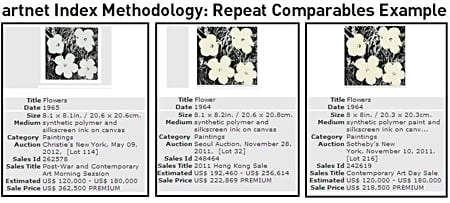Market
Thomas Galbraith’s TEFAF Presentation on Top Performing Artists: Part Two of Four
artnet's Index Methodology.

artnet's Index Methodology.

Thomas Galbraith

In part one of this presentation, I discussed the discipline metrics of sales volume and sales value in terms of defining top performing artists. We also use these parameters to define our own market sector indices, such as Contemporary, Modern, and Impressionist Indices.
artnet is the only art index to hold itself to the standard of a financial index and publish its entire methodology online.
Our patent-pending index methodology is a hybrid of repeat sales and hedonic regression. Perhaps the best way to think of it is as a repeat comparables method.
This data allows us to see an index of individual series by an artist, such as Andy Warhol (American, 1928–1987):
You can also use this information to see an artist index, which is a combination of all of his or her sub-indices:
Lastly, these records can provide market sector indices, which combine all the top artists from collecting categories such as Contemporary Art and Modern Art.
To learn more about the artnet Index generation system and the calculation involved, read the complete artnet Indices White Paper.
Create your own Analytics Report.